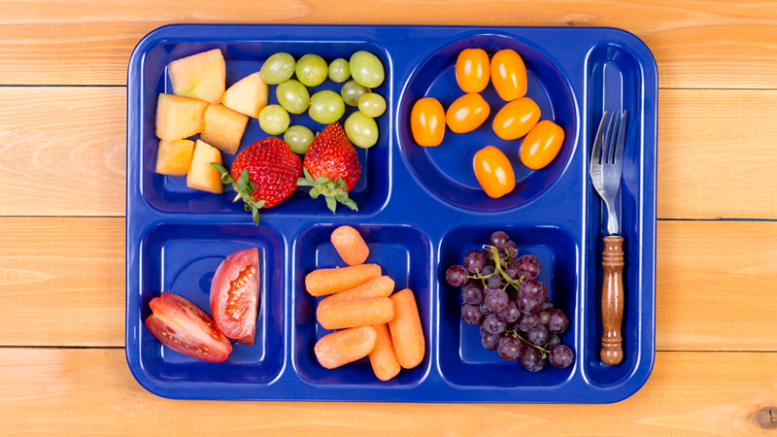Back-to-School means back to the cafeteria. For some students, this is no problem: they eat what they eat and they don’t really care that their lunch looks different than other kids’ lunches. For others, anxieties about being different, fitting in, and having a special diet can make the cafeteria an even more daunting experience than it already is. Compounding these concerns, it’s often difficult to get schools to accommodate the PKU diet, despite the fact that doing so is required by law. (More on that here.)
One of the goals of PKU News is to provide day-to-day support for those living with PKU, and that includes recipes & off-the shelf meal and food ideas. Many of us do not have coverage for medical foods, and many children are picky eaters. We’ve created a chart with recommendations for school meal accommodations that include recipes from CookForLove.org, Cambrooke Foods, and store-bought products that are compatible with the diet. Some recipes can be made ahead by the school foodservice, or by the parents, and then frozen and kept at school until served. Click here to download this chart.
Working with your school
Meal and snack accommodations under the Individuals with Disabilities Act (IDEA) are to be made at the expense of the school. However, IDEA is recognized as an “unfunded mandate.” This means that schools do not have a line item in their budgets for meal accommodations. Schools may be hesitant or worried about committing to making PKU meal accommodations. One successful approach may be to establish an open working relationship with your school food service director. Request a meeting with school staff that includes the food service director/manager, school nurse, classroom teacher, and principal.
USDA Medical Statement
Prepare for the meeting by having your clinic fill out the USDA Medical Statement before the meeting. In the resource section below, see the link for the USDA’s own guide for meal accommodations. This guidebook can inform the understanding of the regulations and opportunities under IDEA. The bottom line is that “reasonable” meal accommodations must be made, and those meal accommodations should not be at the family expense, even thought schools may find it difficult to identify funding sources for PKU meal accommodations. Working closely with your school administration will help you arrive at “reasonable” accommodations for your child or yourself. When it is medically necessary, you have the right to request a specific brand. If this is necessary (i.e. a child can eat only a certain brand of dairy-free yogurt because the phe count is low enough), then it should be specified on the Medical Statement. Click here to download a sample USDA Medical Statement for a child with PKU. Note: each state has its own USDA Medical Statement form, so make sure to obtain the correct one from your state.
Cambrooke Foods offers a school lunch program that a school or district can subscribe to and purchase a low-phe foods menu and foodservice. Cambrooke will assist with set up and subscription if a school is willing to purchase the program.
SPECIAL SITUATIONS
Snacks, Treats, Parties
Parties and celebrations that include food are a common occurrence at school. There are a few ways to prepare ahead of time and those ideas can be written into the 504 or IEP.
Stock the classroom with a few shelf-stable PKU foods. This could include store-bought items (Synders Gluten Free Pretzels) or Cook for Love Crunchy Granola Bars, CFL or TC cookies.
Ask the teacher to give a 48-hour notice of a classroom event and bring CFL Soft Pretzels or Quick Cinnamon Buns.
Medical formula
Medical formula is a very important part of a PKU student’s learning. Taken 2-4 times per day can help blood phe levels stay in a more stable range (versus peaks and valleys). This steady-state will help directly with classroom management and learning. There are a few options to consider and included in the 504 or IEP:
- Drink it in the class
- Go to the nurse’s office to drink it
- Request a mini-fridge in the classroom. Might help to offer to share space with the teacher or other students with meal accommodations.
- Request allowance of a cooler or bottle at their desk
- Request the use of the teacher’s lounge refrigerator
Medication
For those on Kuvan, it can be scheduled to be taken before and after school.
Dorm rooms
Accommodations in campus dorm rooms can be requested. Consider requesting the allowance of a hot water kettle, a mini griddle (ie Dash), a fridge, and a microwave in the dorm room or campus apartment. Equipment must be purchased at your expense and typically must be approved by student housing. Adding these to a college 504 plan or IEP is a good idea. Remember to request a Medical Statement form from your clinic.
Learning: classrooms, work, & tests
PKU can affect learning, classroom management, and test-taking. Educating teachers about PKU and its effect on the brain is an important task. The New England Consortium of Metabolic Programs and Boston Children’s have created The Educator’s Guide to PKU, a very helpful tool for educating teachers and other school staff about PKU, and the NPKUA has a guide as well. There is a longer discussion of classroom accomodations (outside of the cafeteria) in this article: Back to School With PKU.
The Legal Details
Individuals with PKU qualify for accommodations and protections under federal law. There are three federal laws related to protecting students with disabilities: The Individuals with Disabilities Act (IDEA), The Americans with Disabilities Act (ADA), and The Rehabilitation Act of 1973, Section 504. PKU is specified as a qualifying condition in the policies of the US Department of Agriculture (USDA). Under these federal laws, meal and learning accommodations for preschoolers, school-age children, and college attending folks are included. Any facility using USDA funding for their meals must comply with IDEA.


